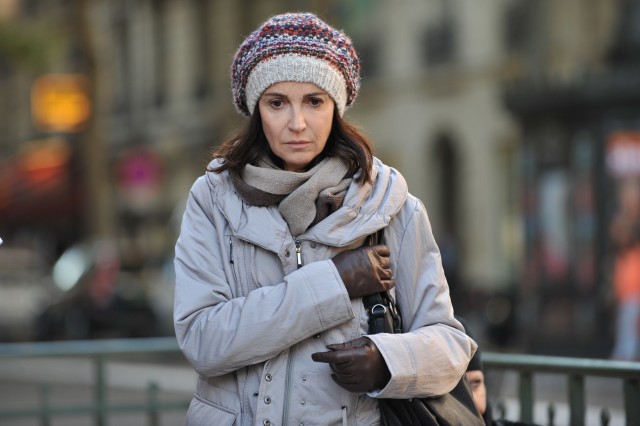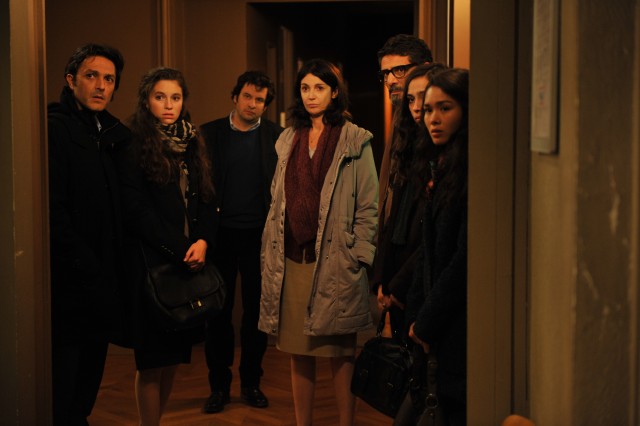
Zabou Breitman gives a harrowing performance as a mother trying to save her kidnapped son in Alexandre Arcady’s 24 DAYS
24 DAYS (24 JOURS) (Alexandre Arcady, 2014)
Quad Cinema
34 West 13th St.
Opens Friday, April 24
212-255-2243
www.quadcinema.com
www.menemshafilms.com/24-days
 On Friday night, January 20, 2006, shortly after having Shabbat dinner with his family, twenty-three-year-old cell-phone salesman Ilan Halimi was kidnapped in Sceaux, and the perpetrators demanded 450,000 Euros as ransom. What happened over the next twenty-four days eventually shocked France and the rest of the world as the details of the abduction, and its frightening anti-Semitic roots, were made public. Director Alexandre Arcady tells the harrowing true story in 24 Days, a gripping procedural that follows the Halimi family and the police as they try to save Ilan’s (Syrus Shahidi) life and find what became known as the Gang of Barbarians, led by Ivory Coast native Youssouf “Django” Fofana (Tony Harrison). Zabou Breitman gives a powerful performance as Ruth Halimi, Ilan’s mother, who quickly grows unhappy with the police’s plan, which involves her ex-husband and Ilan’s father, Didier (Pascal Elbé), challenging Django over the course of hundreds of phone calls, aided by Commander Delcour (Jacques Gamblin) and police psychologist Brigitte Farrell (Sylvie Testud). With time running out and the police refusing to acknowledge the situation as a hate crime, the family becomes even more desperate, leading to a chilling conclusion.
On Friday night, January 20, 2006, shortly after having Shabbat dinner with his family, twenty-three-year-old cell-phone salesman Ilan Halimi was kidnapped in Sceaux, and the perpetrators demanded 450,000 Euros as ransom. What happened over the next twenty-four days eventually shocked France and the rest of the world as the details of the abduction, and its frightening anti-Semitic roots, were made public. Director Alexandre Arcady tells the harrowing true story in 24 Days, a gripping procedural that follows the Halimi family and the police as they try to save Ilan’s (Syrus Shahidi) life and find what became known as the Gang of Barbarians, led by Ivory Coast native Youssouf “Django” Fofana (Tony Harrison). Zabou Breitman gives a powerful performance as Ruth Halimi, Ilan’s mother, who quickly grows unhappy with the police’s plan, which involves her ex-husband and Ilan’s father, Didier (Pascal Elbé), challenging Django over the course of hundreds of phone calls, aided by Commander Delcour (Jacques Gamblin) and police psychologist Brigitte Farrell (Sylvie Testud). With time running out and the police refusing to acknowledge the situation as a hate crime, the family becomes even more desperate, leading to a chilling conclusion.
Based on Ruth Halimi and Émilie Frèche’s book, the film, cowritten by Frèche, Antoine Lacomblez, and Arcady (Last Summer in Tangiers, Le Grand Carnaval), evokes such kidnapping thrillers as Akira Kurosawa’s High and Low and Don Siegel’s Dirty Harry, except here it’s all true; Arcady even shot much of 24 Days in the actual locations where the events happened, including the real police precinct where the Halimis spent much of those twenty-four days. Elbé (The Other Son, Tête de Turc) is terrific as the father, who tries to keep his cool as he deals with Django, an emotionally volatile and unpredictable criminal. The film is particularly relevant given the rising tide of anti-Semitism in Europe; in a press-kit interview, Elbé states, “When we see [Dieudonné] M’Bala M’Bala nostalgic for [Philippe] Pétain and the young people who take to the streets and cry pre-war slogans, we realize that we in France have learned nothing from history. I am appalled by the feebleness of the reaction provoked by the ideas of people like Dieudonné and the deafening silence of some artists. Truly, something has gone very wrong in our society.” Arcady’s chilling film is evidence that something indeed has gone very wrong.
